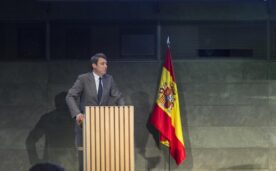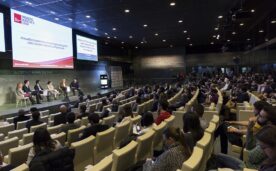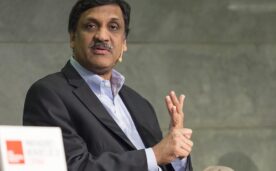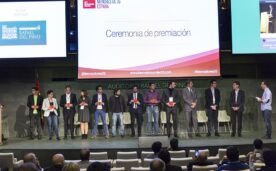On Thursday 3 December, the Rafael del Pino Foundation organised the meeting on talent and competitiveness together with EmTech Spain and the MIT Technology Review, which brought together the most innovative young Spaniards in the field of technology, selected in the "Innovators under 35 Spain" competition, and consolidated entrepreneurs who stand out for their disruptive innovative initiatives.
The Innovators under 35 awards are a global benchmark in the discovery and promotion of emerging talent. Biomedicine, software development, materials, telecommunications... whatever the area of technology in which they work, all the winners have in common the creativity with which they respond to current needs and the social and economic impact of their projects.
Summary: Innovators under 35 Spain
3 December 2015
One of the great challenges facing the Spanish economy is to transform scientific research into business projects. This requires the creation of efficient innovation channels to transform scientific discoveries into business ideas.
On 3 December, the Rafael del Pino Foundation hosted the MIT Technology Review's awards ceremony for innovators under the age of 35.
The event began with a speech by Pedro Moneo, director of the magazine and CEO of Opinno, who pointed out that there are three factors in entrepreneurs: technological, business and social. Moneo indicated that, with these awards, we are looking for the scientist or technologist who is an entrepreneur, who has projects with a very high potential.
Moneo also said that one of the purposes of these awards is to create a community of award winners who are in permanent contact, exchanging experiences and offering support. "Our great ambition would be to create a business accelerator," he said.
Afterwards, Paloma Cabello, co-founder of MIT Enterprise Forum Spain, moderated the round table "Involving researchers and entrepreneurs in the solution of major global challenges", with the participation of Ángel Alberich, founder of Quibim; Daniel Pardo, CEO of Farsens, and Miriam Reyes, founder of Aprendices Visuales.
Alberich denounced the fact that research in Spain is carried out in silos, in watertight, single-thematic compartments focused on theoretical issues. This situation contrasts with the laboratories of the Massachusetts Institute of Technology (MIT), which are focused on the problem to be solved and go from working in a specific discipline to interacting with other fields. This is why he asked to fill our laboratories with multidisciplinarity.
In turn, Pardo pointed out that there is a need for inspiring models on how to transform research into business. He also said that we need to work from the ground up, bringing the practical elements to schools, so that people can discover there what they like to do.
Finally, Miriam Reyes indicated that multidisciplinarity has to be born out of empathy. She also considered it necessary to be trained in different fields of action in order to be able to understand others.
The second round table was dedicated to "Spanish innovators in emerging technologies: how to turn talent into competitiveness", with the participation of Jorge Bravo-Abad, researcher at the Autonomous University of Madrid; David Horna, founder of Aglaris Cell; Ana Sáenz de Miera, general director of Ashoka Spain; Javier García Martínez, researcher at the University of Alicante, and Eduardo Díaz, director of the Technology-Based Entrepreneurship Area of Madri+d.
For Bravo, the most important thing is to establish an efficient innovation channel that allows those who have made a scientific discovery to turn it into a business project. He also considers it very important to be able to access venture capital to finance it.
Horna, for his part, pointed out the difficulty of finding references and support to make this transition, among other reasons due to the lack of a sufficient number of investment funds. He also called for the removal of initial bureaucratic hurdles for start-ups.
Ana Sáenz de Miera, in turn, stressed that social entrepreneurs provide a vision of what the world would be like if a problem ceased to exist and pointed out that the solution must be systematised so that it can be replicated. He also denounced the failure of schools to identify talent. Finally, he called for the creation of the legal form of a general interest limited company for social entrepreneurship projects.
Javier García Martínez focused on talent, which he said his company is committed to. Part of that talent is the investors, but also the customers, because they allow us to better understand why a technology works or why it does not. The company's employees are also part of this talent and we must be able to communicate the company's value proposition to them. Finally, she considered it essential for women to participate in all areas, including management bodies.
Eduardo Díaz pointed out that the challenge for public institutions is to go ahead to find those niches that are not offered to entrepreneurs. He also said that the main challenges for business are marketing, financing and the search for qualified personnel and, in the last five years, internationalisation. He also considered it important to create mechanisms to encourage support from institutions.
The last speaker was Anant Agarwal, MIT professor and CEO of edX, the massive online course platform, who highlighted the importance of continuous learning in today's society in order to adapt to the changes that technological disruption is bringing to the world of work.
The winners of the 2015 edition of "Innovators under 35" are:
-Angel Alberich: Diagnoses will be more objective and accurate thanks to its algorithms for processing medical images.
-Jorge Bueno: Its indoor positioning system is more accurate and less intrusive.
Carlos Castro: His non-invasive white blood cell counting device protects cancer patients receiving chemotherapy.
Rubén Criado: His T-ray generator could put an end to the risks of X-rays forever.
-Leticia Fernández: Its active carbon filters remove pollutants from the water with sunlight alone.
-Roberto Gómez: Its virtual desktop allows access to all programmes from any location and device.
-Miguel Luengo: Accelerating malaria diagnosis with his collaborative video game.
-Daniel Pardo: His wireless sensors work without batteries or cables.
-Miriam Reyes: Helping children with autism to learn through her adapted digital stories.
-José Luis Rubio: His technology reduces the number of unnecessary biopsies to diagnose skin cancer.
The Social Innovator of the Year Award went to Miguel Luengo, and the Innovator of the Year Award to Carlos Castro.






